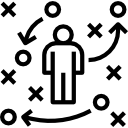INFORMATION AREAS
Health 
From the very beginning of human civilization, people have been looking for ways to live not only healthily but also wisely. Already with a number of ancient philosophers, the state of harmony of physical and mental health has become the ideal of human life. We will try to look at the health and healthy lifestyle preferred by young people.
What will you know?
THE CONCEPT OF HEALTH: When do we become interested in health and why does it focus on what mental and physical health is.
HEALTHY LIFESTYLE: An approach that can affect human health positively but also negatively. You will learn what to do for your health, what are organic foods, fitness and problems associated with eating disorders.
HEALTHY NUTRITION AND HEALTHY FOOD: It may not always suit your needs and therefore it is good to know the needs in the diet. You will learn the difference between food allergy and food intolerance, what types of allergies and intolerances exist, what foods you can consume and you will also find websites with recipes.
Quote
"Health is not everything, but without health everything is nothing." - Arthur Schopenhauer
What will it bring you?
- Knowledge of individual areas of health and healthy lifestyle.
- If you have restrictions in eating, there is overview of it.
- Here you will find options to start the activity.
- How to be happy with your SELF.
- A portfolio of resources where you can find the information you need.
How about a little professionally?
What do we mean by health?
Health is a state of complete physical, mental and social well-being, and not just the absence of disease or dysfunction (according to the WHO).
The concept of health is closely related to another basic concept, namely disease. Both of these concepts represent opposites in the feelings of the individual. Illness is a deviation from health. Most of us cite health as the most important value, but we think mainly of physical health. Its integral part, mental health, is often forgotten. In researching the risk factors of various diseases, not only the influence of lifestyle, eating habits, workload and physical activity was gradually clarified, but also the significant influence of mood, attitudes, approach to the disease and other people on the origin and course of acute but especially chronic diseases.
Mental health
Well-being care should be part of our daily routine. We stress less and laugh more. Full health and quality of life cannot be achieved without mental health. The consequences of social isolation, worries, fear, anxiety, all affect us every day. We can change this by taking care of our physical and mental health. Talk about your feelings, focus on what we love, be active, play sports, eat healthily.
The World Federation of Mental Health - WHMH - describes mentally healthy people as follows:
1. They have a good attitude towards themselves - they do not let themselves be overwhelmed by their own emotions, such as fear, anger, jealousy, feelings of guilt or worries; they do not underestimate or overestimate their abilities; they can rise above life's failures; they have a tolerant attitude towards themselves as well as others.
2. They feel good among other people - they can show love and take into account the interests of others; have lasting and satisfactory personal relationships; they love and trust others and assume the same attitude towards others; respect the differences between people; they do not exploit others and are not abused.
3. They are able to cope with the demands of life - when problems arise, they are solved constructively, they are responsible, they are willing to adapt if necessary, they plan in advance and they are not afraid of the future; welcome new experiences and ideas; use their skills; they set realistic goals; they are able to make their own decisions; they are happy when they do everything they do with all their effort.
Factors that affect health:
a) internal factors - are mostly hereditary factors that the individual acquires within the ontogenetic development from both parents
b) external factors - which affect our health, are made up of:
- Demographic determinants (gender, age structure, birth rate, mortality)
- Socio-economic determinants (lifestyle, education, employment, social contacts)
There are characteristics and indicators that influence the presence and development of disease risk factors.
Physical health
"In a healthy body, a healthy spirit." A statement that confirms that a person feels good when he is healthy. And not only physically but also mentally. Exercise, water, sleep, diet, probably the biggest basis for physical health. When we move actively in the body, we are exposed to substances called endorphins, which make you feel good.
Healthy lifestyle:
A healthy lifestyle focuses on quality and healthy foods that our body can easily accept and process. A healthy diet should contain the amount of vitamins and minerals that our body needs for proper organ function. If you want to feel fit, healthy, or just want to have a nice figure, your daily diet should include a varied diet rich in vitamins and minerals.
There are also certain health problems associated with eating, where we can also include eating disorders, which are increasingly mentioned. The reason for these disorders is not known many times, but the trigger can be many factors, such as environmental pressure, mental stress, human nature, social environment, age and the like. However, the most common reason for young people's eating disorders is the desire to enjoy the environment and adapt to current trends. It is important to realize that what we see on social networks is not always what it looks like. Perfect skin, slim figure, beautiful thick hair, tanned and problem-free skin and much more that haunt us every day. It's important to keep in mind that it's just an online world where actors have had a lot of surgery, botox, photo editing or more.
Organic food:
Today, many people prefer organic foods or fitness diets, which have also spread in retail chains. Foods for everyday consumption are mostly already in organic versions. Organic food is a product that is grown without the use of chemicals and has a great impact on environmental friendliness. Consumption of organic food does not guarantee an improvement in human health, but a better taste and smell of products, higher content of vitamins, elimination of chemicals and conservation of nature.
Fitness:
A fast pace of life brings us many health problems and therefore a healthy lifestyle is increasingly important. Regular exercise brings us an improvement in our health as well as our mental state. Fitness is gaining more and more prominence, when young people are also interested in exercise, a healthy diet and perceive it as relaxation and their hobbies.
A healthy lifestyle is nothing but learned, purposeful and systematic activities that an individual performs for his or her health and physical and mental beauty. Each of us has the greatest share of health in our own hands, it is not unnecessarily said: "You are what you eat" or "A healthy spirit in a healthy body."
Healthy nutrition and healthy diet
Diet significantly affects not only how we feel, but also how we look. It is important to choose a varied diet full of vitamins. The body cannot make vitamins on its own, so it needs to be supplemented in the form of a diet. Fresh vegetables are a source of many vitamins that the body needs, so it is good to have a portion every day. Last but not least, preventing a healthy body is getting rid of harmful habits such as tobacco, drugs, alcohol, etc.
The difference between food allergy and food intolerance is:
Food allergy: After eating a food that you have an allergy to, your immune system will automatically respond by triggering an allergic reaction, which may include swelling, diarrhea, vomiting, rashes, or may be more severe, leading to anaphylactic shock.
Food intolerance: The so-called intolerance of some foods, which does not appear automatically after eating a particular food but only after a few days. Food breaks down into individual parts that pass through the intestinal wall into the bloodstream. If your body regularly eats inappropriate foods, it can lead to serious health problems.
There are many allergens in food and therefore it is necessary to monitor the behavior of your body. Food allergies are caused by a malfunction of the immune system, which can perceive certain foods as its enemy and the body automatically resists them. There are many types of allergies and intolerances, we name the most common. Allergies are found in peanuts, nuts, almonds, eggs, milk, fish, crustaceans or yeast. The most well-known types of intolerances are celiac disease, histamine intolerance, lactose intolerance, gluten intolerance or other foods.






